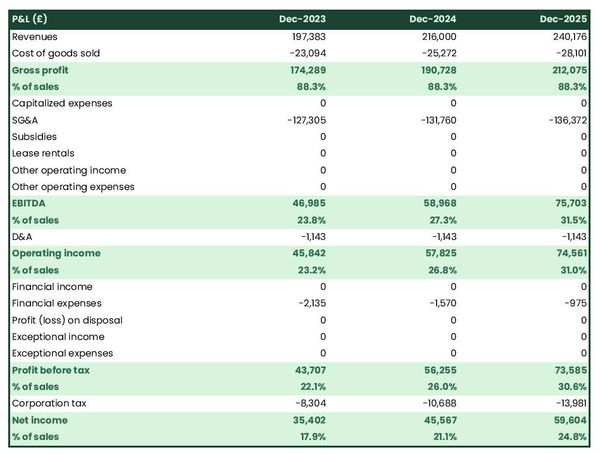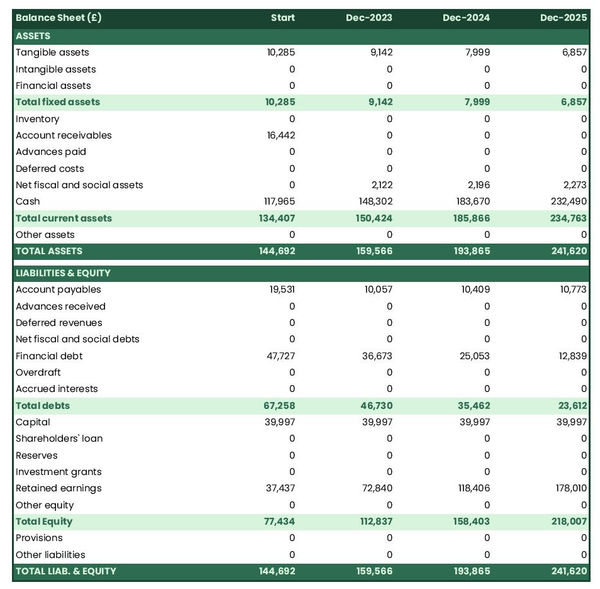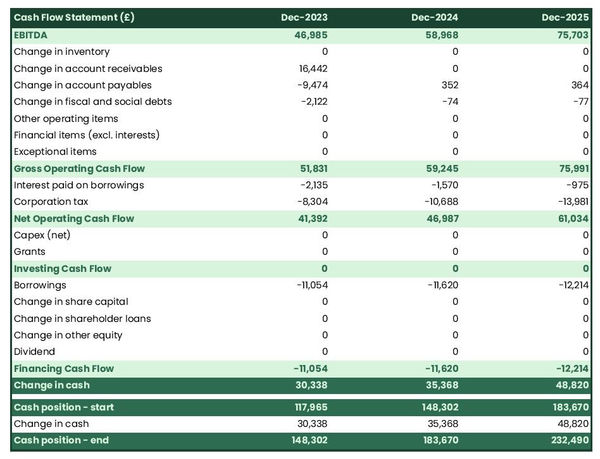How to write a business plan for a drama school?

Writing a business plan for a drama school can be an intimidating task, especially for those just starting.
This in-depth guide is designed to help entrepreneurs like you understand how to create a comprehensive business plan so that you can approach the exercise with method and confidence.
We'll cover: why writing a drama school business plan is so important - both when starting up, and when running and growing the business - what information you need to include in your plan, how it should be structured, and what tools you can use to get the job done efficiently.
Let's get started!
Why write a business plan for a drama school?
Understanding the document's scope and goals will help you easily grasp its structure and content. Before diving into the specifics of the plan, let's take a moment to explore the key reasons why having a drama school business plan is so crucial.
To have a clear roadmap to grow the business
Small businesses rarely experience a constant and predictable environment. Economic cycles go up and down, while the business landscape is mutating constantly with new regulations, technologies, competitors, and consumer behaviours emerging when we least expect it.
In this dynamic context, it's essential to have a clear roadmap for your drama school. Otherwise, you are navigating in the dark which is dangerous given that - as a business owner - your capital is at risk.
That's why crafting a well-thought-out business plan is crucial to ensure the long-term success and sustainability of your venture.
To create an effective business plan, you'll need to take a step-by-step approach. First, you'll have to assess your current position (if you're already in business), and then identify where you'd like your drama school to be in the next three to five years.
Once you have a clear destination for your drama school, you'll focus on three key areas:
- Resources: you'll determine the human, equipment, and capital resources needed to reach your goals successfully.
- Speed: you'll establish the optimal pace at which your business needs to grow if it is to meet its objectives within the desired timeframe.
- Risks: you'll identify and address potential risks you might encounter along the way.
By going through this process regularly, you'll be able to make informed decisions about resource allocation, paving the way for the long-term success of your business.
Need a convincing business plan?
The Business Plan Shop makes it easy to create a financial forecast to assess the potential profitability of your projects, and write a business plan that’ll wow investors.

To anticipate future cash flows
Regularly comparing your actual financial performance to the projections in the financial forecast of your drama school's business plan gives you the ability to monitor your business's financial health and make necessary adjustments as needed.
This practice allows you to detect potential financial issues, such as unexpected cash shortfalls before they escalate into major problems. Giving you time to find additional financing or put in place corrective measures.
Additionally, it helps you identify growth opportunities, like excess cash flow that could be allocated to launch new products and services or expand into new markets.
Staying on track with these regular comparisons enables you to make well-informed decisions about the amount of financing your business might require, or the excess cash flow you can expect to generate from your main business activities.
To secure financing
Crafting a comprehensive business plan for your drama school, whether you're starting up or already established, is paramount when you're seeking financing from banks or investors.
Given how fragile small businesses are, financiers will want to ensure that you have a clear roadmap in place as well as command and control of your future cash flows before entertaining the idea of funding you.
For banks, the information in your business plan will be used to assess your borrowing capacity - which is defined as the maximum amount of debt your business can afford alongside your ability to repay the loan. This evaluation helps them decide whether to extend credit to your business and under what terms (interest rate, duration, repayment options, collateral, etc.).
Similarly, investors will thoroughly review your plan to determine if their investment can yield an attractive return. They'll be looking for evidence that your drama school has the potential for healthy growth, profitability, and consistent cash flow generation over time.
Now that you understand the importance of creating a business plan for your drama school, let's delve into the necessary information needed to craft an effective plan.
Need a convincing business plan?
The Business Plan Shop makes it easy to create a financial forecast to assess the potential profitability of your projects, and write a business plan that’ll wow investors.

Information needed to create a business plan for a drama school
You need the right data in order to project sales, investments and costs accurately in the financial forecast of your drama school business plan.
Below, we'll cover three key pieces of information you should gather before drafting your business plan.
Carrying out market research for a drama school
Before you begin writing your business plan for a drama school, conducting market research is a critical step in ensuring precise and realistic financial projections.
Market research grants you valuable insights into your target customer base, competitors, pricing strategies, and other crucial factors that can impact the success of your business.
In the course of this research, you may stumble upon trends that could impact your drama school.
You could find out that there may be a growing interest in online classes, or that people may be looking for more flexible payment options. Market research could reveal that potential students might prefer shorter courses or that there may be a greater demand for a wider range of courses.
Such market trends play a pivotal role in revenue forecasting, as they provide essential data regarding potential customers' spending habits and preferences.
By integrating these findings into your financial projections, you can provide investors with more accurate information, enabling them to make well-informed decisions about investing in your drama school.
Developing the marketing plan for a drama school
Before delving into your drama school business plan, it's imperative to budget for sales and marketing expenses.
To achieve this, a comprehensive sales and marketing plan is essential. This plan should provide an accurate projection of the necessary actions to acquire and retain customers.
Additionally, it will outline the required workforce to carry out these initiatives and the corresponding budget for promotions, advertising, and other marketing endeavours.
By budgeting accordingly, you can ensure that the right resources are allocated to these vital activities, aligning them with the sales and growth objectives outlined in your business plan.
The staffing and equipment needs of a drama school
Whether you are at the beginning stages of your drama school or expanding its horizons, having a clear plan for recruitment and capital expenditures (investment in equipment and real estate) is vital to ensure your business's success.
To achieve this, both the recruitment and investment plans must align coherently with the projected timing and level of growth in your forecast. It is essential to secure appropriate funding for these plans.
A drama school might incur staffing costs such as salaries for teachers, directors, and other support staff, as well as costs related to recruiting and hiring new staff. Additionally, they might incur costs related to equipment such as lights, sound systems, props, and costumes. Finally, they may also have to pay for other items such as studio space and marketing materials.
To create a financial forecast that accurately represents your business's outlook, remember to factor in other day-to-day operating expenses.
Now that you have all the necessary information, it's time to dive in and start creating your business plan and developing the financial forecast for your drama school.
Need a convincing business plan?
The Business Plan Shop makes it easy to create a financial forecast to assess the potential profitability of your projects, and write a business plan that’ll wow investors.

What goes into your drama school's financial forecast?
The financial forecast of your drama school will enable you to assess the profitability potential of your business in the coming years and how much capital is required to fund the actions planned in the business plan.
The four key outputs of a financial forecast for a drama school are:
- The profit and loss (P&L) statement,
- The projected balance sheet,
- The cash flow forecast,
- And the sources and uses table.
Let's take a closer look at each of these.
The projected P&L statement
The projected P&L statement for a drama school shows how much revenue and profit your business is expected to make in the future.

A healthy drama school's P&L statement should show:
- Sales growing at (minimum) or above (better) inflation
- Stable (minimum) or expanding (better) profit margins
- A healthy level of net profitability
This will of course depend on the stage of your business: numbers for a startup will look different than for an established drama school.
The projected balance sheet of your drama school
Your drama school's forecasted balance sheet enables the reader of your plan to assess your financial structure, working capital, and investment policy.
It is composed of three types of elements: assets, liabilities and equity:
- Assets: represent what the business owns and uses to produce cash flows. It includes resources such as cash, equipment, and accounts receivable (money owed by clients).
- Liabilities: represent funds advanced to the business by lenders and other creditors. It includes items such as accounts payable (money owed to suppliers), taxes due and loans.
- Equity: is the combination of what has been invested by the business owners and the cumulative profits and losses generated by the business to date (which are called retained earnings). Equity is a proxy for the value of the owner's stake in the business.

Your drama school's balance sheet will usually be analyzed in conjunction with the other financial statements included in your forecast.
Two key points of focus will be:
- Your drama school's liquidity: does your business have sufficient cash and short-term assets to pay what it owes over the next 12 months?
- And its solvency: does your business have the capacity to repay its debt over the medium-term?
The projected cash flow statement
A cash flow forecast for a drama school shows how much cash the business is projected to generate or consume.

The cash flow statement is divided into 3 main areas:
- The operating cash flow shows how much cash is generated or consumed by the operations (running the business)
- The investing cash flow shows how much cash is being invested in capital expenditure (equipment, real estate, etc.)
- The financing cash flow shows how much cash is raised or distributed to investors and lenders
Looking at the cash flow forecast helps you to ensure that your business has enough cash to keep running, and can help you anticipate potential cash shortfalls.
It is also a best practice to include a monthly cash flow statement in the appendices of your drama school business plan so that the readers can view the impact of seasonality on your business cash position and generation.
The initial financing plan
The sources and uses table or initial financing plan is a key component of your business plan when starting a drama school.
It shows where the capital needed to set up the business will come from (sources) and how it will be spent (uses).

This table helps size the investment required to set up the drama school, and understand how risks will be distributed between the business owners, and the financiers.
The sources and uses table also highlights what the starting cash position will be. This is key for startups as the business needs to have sufficient funding to sustain operations until the break-even point is reached.
Now that you have a clear understanding of what will go into the financial forecast of your drama school business plan, let's have a look at the written part of the plan.
Need a convincing business plan?
The Business Plan Shop makes it easy to create a financial forecast to assess the potential profitability of your projects, and write a business plan that’ll wow investors.

The written part of a drama school business plan
The written part of a drama school business plan is composed of 7 main sections:
- The executive summary
- The presentation of the company
- The products and services
- The market analysis
- The strategy
- The operations
- The financial plan
Throughout these sections, you will seek to provide the reader with the details and context needed for them to form a view on whether or not your business plan is achievable and your forecast a realistic possibility.
Let's go through the content of each section in more detail!
1. The executive summary
The executive summary, the first section of your drama school's business plan, serves as an inviting snapshot of your entire plan, leaving readers eager to know more about your business.
To compose an effective executive summary, start with a concise introduction of your business, covering its name, concept, location, history, and unique aspects. Share insights about the services or products you intend to offer and your target customer base.
Subsequently, provide an overview of your drama school's addressable market, highlighting current trends and potential growth opportunities.
Then, present a summary of critical financial figures, such as projected revenues, profits, and cash flows.
You should then include a summary of your key financial figures such as projected revenues, profits, and cash flows.
Lastly, address any funding needs in the "ask" section of your executive summary.
2. The presentation of the company
In your drama school business plan, the second section should focus on the structure and ownership, location, and management team of your company.
In the structure and ownership part, you'll provide an overview of the business's legal structure, details about the owners, and their respective investments and ownership shares. This clarity is crucial, especially if you're seeking financing, as it helps the reader understand which legal entity will receive the funds and who controls the business.
Moving on to the location part, you'll offer an overview of the company's premises and their surroundings. Explain why this particular location is of interest, highlighting factors like catchment area, accessibility, and nearby amenities.
When describing the location of your drama school, you could emphasize the potential it has to draw students from a wide-reaching area. It may be located in a large metropolitan area, with access to public transportation and plenty of nearby cultural attractions. You might point out that the city is large enough to provide a range of cultural experiences and opportunities for growth, yet small enough to offer a friendly, welcoming atmosphere. You can also highlight the diverse mix of people living in the area, which could make it an ideal learning environment for your students.
Finally, you should introduce your management team. Describe each member's role, background, and experience.
Don't forget to emphasize any past successes achieved by the management team and how long they've been working together. Demonstrating their track record and teamwork will help potential lenders or investors gain confidence in their leadership and ability to execute the business plan.
3. The products and services section
The products and services section of your drama school business plan should include a detailed description of what your company sells to its customers.
For example, your drama school could offer customers classes on various aspects of drama such as acting, improvisation, musical theatre, and voice. This would give customers the opportunity to develop their skills and explore different areas of theatre. It could also offer a range of workshops covering topics like audition techniques, scriptwriting, and character development. This would provide customers with the tools they need to be successful in the industry. Finally, the school could offer one-on-one mentorship sessions with experienced theatre professionals. This would give customers the opportunity to receive personalized advice and guidance.
The reader will want to understand what makes your drama school unique from other businesses in this competitive market.
When drafting this section, you should be precise about the categories of products or services you sell, the clients you are targeting and the channels that you are targeting them through.
4. The market analysis
When presenting your market analysis in your drama school business plan, you should detail the customers' demographics and segmentation, target market, competition, barriers to entry, and any regulations that may apply.
The goal of this section is to help the reader understand how big and attractive your market is, and demonstrate that you have a solid understanding of the industry.
You should start with the demographics and segmentation subsection, which gives an overview of the addressable market for your drama school, the main trends in the marketplace, and introduces the different customer segments and their preferences in terms of purchasing habits and budgets.
The target market section should follow and zoom on the customer segments your drama school is targeting, and explain how your products and services meet the specific needs of these customers.
For example, your target market might include aspiring actors who are looking to sharpen their skills. These could include high school students looking to develop their craft or adults interested in changing careers. These individuals would be looking for comprehensive training to improve their work, and create a network of contacts in the industry.
Then comes the competition subsection, where you should introduce your main competitors and explain what differentiates you from them.
Finally, you should finish your market analysis by giving an overview of the main regulations applicable to your drama school.
Need a convincing business plan?
The Business Plan Shop makes it easy to create a financial forecast to assess the potential profitability of your projects, and write a business plan that’ll wow investors.

5. The strategy section
When crafting the strategy section of your business plan for your drama school, it's important to cover several key aspects, including your competitive edge, pricing strategy, sales & marketing plan, milestones, and risks and mitigants.
In the competitive edge subsection, clearly explain what sets your company apart from competitors. This is particularly critical if you're a startup, as you'll be trying to establish your presence in the marketplace among entrenched players.
The pricing strategy subsection should demonstrate how you aim to maintain profitability while offering competitive prices to your customers.
For the sales & marketing plan, outline how you plan to reach and acquire new customers, as well as retain existing ones through loyalty programs or special offers.
In the milestones subsection, detail what your company has achieved thus far and outline your primary objectives for the coming years by including specific dates for expected progress. This ensures everyone involved has clear expectations.
Lastly, in the risks and mitigants subsection, list the main risks that could potentially impact the execution of your plan. Explain the measures you've taken to minimize these risks. This is vital for investors or lenders to feel confident in supporting your venture - try to proactively address any objection they might have.
Your drama school could face the risk of a natural disaster such as a fire or flood. In such a situation, it might cause major disruption to your school, damaging property and records, and causing a significant loss of income. Your drama school could also risk the possibility of cyber-attacks, where malicious software and viruses could infect systems and lead to a data breach. This could lead to financial losses, disruption to your services, and a breach of data privacy for any of your students and staff.
6. The operations section
The operations of your drama school must be presented in detail in your business plan.
The first thing you should cover in this section is your staffing team, the main roles, and the overall recruitment plan to support the growth expected in your business plan. You should also outline the qualifications and experience necessary to fulfil each role, and how you intend to recruit (using job boards, referrals, or headhunters).
You should then state the operating hours of your drama school - so that the reader can check the adequacy of your staffing levels - and any plans for varying opening times during peak season. Additionally, the plan should include details on how you will handle customer queries outside of normal operating hours.
The next part of this section should focus on the key assets and IP required to operate your business. If you depend on any licenses or trademarks, physical structures (equipment or property) or lease agreements, these should all go in there.
You could have a range of key assets and IP as a drama school. This may include the copyright of plays produced by the school, as well as the physical infrastructure of the school, such as the stage, theatre, sound system and the costumes for any productions. These may be valuable assets that the school could use to their advantage. Additionally, the school may have exclusive access to other resources, such as the expertise of certain teachers or a library of scripts that could be used by students. These could be important IPs for the school to maintain.
Finally, you should include a list of suppliers that you plan to work with and a breakdown of their services and main commercial terms (price, payment terms, contract duration, etc.). Investors are always keen to know if there is a particular reason why you have chosen to work with a specific supplier (higher-quality products or past relationships for example).
7. The presentation of the financial plan
The financial plan section is where we will include the financial forecast we discussed earlier in this guide.
Now that you have a clear idea of what goes into a drama school business plan, let's look at some of the tools you can use to create yours efficiently.
Need a convincing business plan?
The Business Plan Shop makes it easy to create a financial forecast to assess the potential profitability of your projects, and write a business plan that’ll wow investors.

What tool should I use to write my drama school's business plan?
In this section, we will be reviewing the two main solutions for creating a drama school business plan:
- Using specialized online business plan software,
- Outsourcing the plan to the business plan writer.
Using an online business plan software for your drama school's business plan
Using online business planning software is the most efficient and modern way to create a drama school business plan.
There are several advantages to using specialized software:
- You can easily create your financial forecast by letting the software take care of the financial calculations for you without errors
- You are guided through the writing process by detailed instructions and examples for each part of the plan
- You can access a library of dozens of complete business plan samples and templates for inspiration
- You get a professional business plan, formatted and ready to be sent to your bank or investors
- You can easily track your actual financial performance against your financial forecast
- You can create scenarios to stress test your forecast's main assumptions
- You can easily update your forecast as time goes by to maintain visibility on future cash flows
- You have a friendly support team on standby to assist you when you are stuck
If you're interested in using this type of solution, you can try The Business Plan Shop for free by signing up here.
Hiring a business plan writer to write your drama school's business plan
Outsourcing your drama school business plan to a business plan writer can also be a viable option.
Business plan writers are experienced in writing business plans and adept at creating financial forecasts without errors. Furthermore, hiring a consultant can save you time and allow you to focus on the day-to-day operations of your business.
However, hiring business plan writers is expensive as you are paying for the software used by the consultant, plus their time, and their profit margin of course.
From experience, you need to budget at least £1.5k ($2.0k) excluding tax for a complete business plan, more if you need to make changes after the initial version (which happens frequently after the initial meetings with lenders or investors).
You also need to be careful when seeking investment. Investors want their money to be used to grow the business, not spent on consulting fees. Therefore, the amount you spend on business plan writing services (and other consulting services such as legal services) needs to be negligible relative to the amount raised.
The other drawback is that you usually don't own the business plan itself: you just get the output, while the actual document is saved in the consultant's business plan software - which makes it difficult to maintain the document up to date without hiring the consultant on a retainer.
For these reasons, outsourcing the drama school business plan to a business plan writer should be considered carefully, weighing both the advantages and disadvantages of hiring outside help.
Ultimately, it may be the right decision for some businesses, while others may find it beneficial to write their business plan using online software.
Need a convincing business plan?
The Business Plan Shop makes it easy to create a financial forecast to assess the potential profitability of your projects, and write a business plan that’ll wow investors.

Why not create your drama school's business plan using Word or Excel?
Using Microsoft Excel and Word (or their Google, Apple, or open-source equivalents) to write a drama school business plan is not advisable. Allow me to explain the reasons.
Firstly, creating an accurate and error-free financial forecast on Excel or any spreadsheet demands technical expertise in accounting principles and financial modelling. Without a degree in finance and accounting and significant financial modelling experience, it's unlikely that the reader will fully trust your numbers.
Secondly, relying on spreadsheets is inefficient. While it may have been the go-to option in the past, technology has evolved, and software now performs such tasks much faster and more accurately.
The second reason is that it is inefficient. Building forecasts on spreadsheets was the only option in the early 2000s, nowadays technology has advanced and software can do it much faster and much more accurately.
And with the rise of AI, software is also becoming smarter at helping us detect mistakes in our forecasts and helping us analyse the numbers to make better decisions.
Moreover, software offers ease in comparing actuals versus forecasts and maintaining up-to-date forecasts for clear visibility on future cash flows, as we discussed earlier in this guide. Such tasks are cumbersome when using spreadsheets.
Now, let's address the written part of your drama school business plan. While it may be less prone to errors, using software can significantly boost productivity. Word processors lack instructions and examples for each section of your business plan. They also won't automatically update your numbers when changes occur in your forecast, and they lack automated formatting capabilities.
In summary, while some entrepreneurs may consider Word or Excel for their business plan, it's far from the best or most efficient solution when compared to specialized software.
Takeaways
- Having an up-to-date business plan is key to maintaining visibility on your future cash flows.
- A business plan has 2 parts: a financial forecast highlighting the expected growth, profitability and cash generation of the business; and a written part which provides the context needed to interpret and assess the quality of the forecast.
- Using business plan software is the modern way of writing and maintaining business plans.
We hope that this guide helped you to better understand how to write the business plan for a drama school. If you still have questions, do not hesitate to contact us.
Also on The Business Plan Shop
- How to write a 5 years business plan
- Business case vs business plan
- How to write the products and services section of your business plan
- How to write the suppliers section of your business plan?
- Business plan myths
Know someone who owns or wants to start a drama school? Share this article with them!




